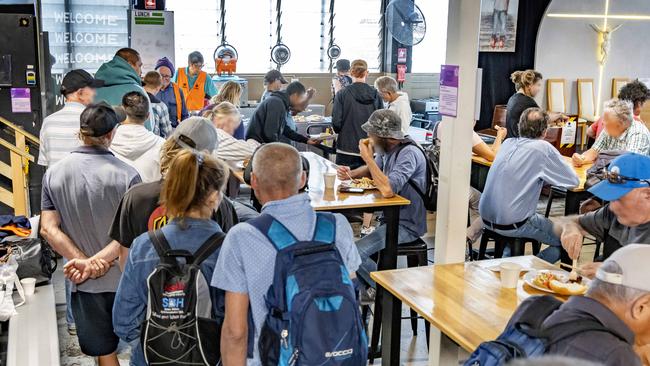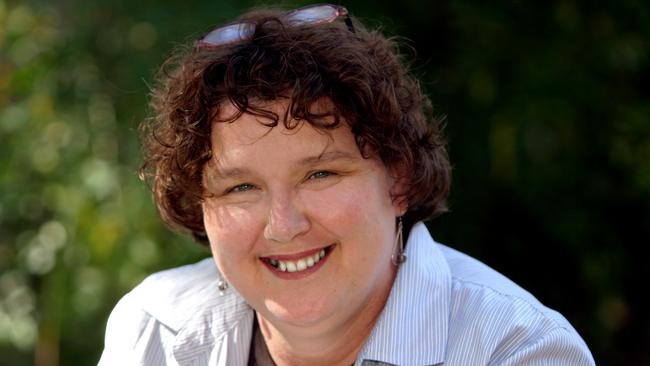Brisbane charities and support services experiencing unprecedented demand during cost-of-living crisis
Brisbane families are doing it tougher than any time in recent memory as the cost-of-living crisis spirals, with charities and support services experiencing unprecedented demand in the wake of the latest interest rate rises.
QLD News
Don't miss out on the headlines from QLD News. Followed categories will be added to My News.
Brisbane support services are experiencing unprecedented demand for help in the wake of the latest interest rate rises as they say more Queenslanders – including working families – are “scraping the bottom of the barrel” amid the cost of living crisis.
It comes as Origin said they will spend approximately $45 million over the current financial year to provide support to the increasing list of customers in hardship and the National Debt Helpline experienced a spike in calls from the working class in the last three months.
Emmanuel City Mission Volunteer Roby Curtis said the charity had seen a significant increase in working individuals and working families coming into their South Brisbane facility in the past six months.
“They're just really scraping the bottom of the barrel,” Mr Curtis said.
“ … They have, say, a house, but they’re just right on the edge of collapse.”
Emmanuel City Mission Operations Manager Tim Noonan said the organisation had gone from serving 600 lunches a week to 1000 a week in the past 12 months.
“That doesn’t include the breakfasts and prepacked dinner meals we serve which has also gone up,” he said.

Emmanuel City Mission visitor Joshua, 41, said he was working as an electrician until about a month ago when he fell ill and was forced to leave his home in Jimboomba.
“I am living under the bridge at William Jolly but I mean without this place I would be screwed,” he said.
“Everybody I know out there (Jimboomba) has people living in tents in their backyards or sleeping on their floors so this is not just a localised phenomenon it’s all over the place,”
Joshua said his situation was difficult because he had qualifications and work references but without accommodation it left him behind.
Joshua said services like Emmanuel were a “blessing.”
“To be able to come here every morning to have a feed and a shower gave me back my dignity, I was at the point where I’d given up,” he said.
Meanwhile, Karen Walsh – the CEO of Micah Projects in West End – said as financial stress increased, the demand for their support service was “constant”.
“Peoples' rent going up is a constant theme of why people have to leave where they’re living and the interest rate rise won’t help them,” she said.

Ms Walsh said increasing rental costs meant people couldn’t pay for other essentials such as health care, recreation, food and “all things that go to having a good life”.
“We‘re seeing our housing services, just constantly dealing with an increasing number of people who need to move because their rent is going up,” she said.
She said there was now a higher demand from people that the organisation would “not typically be working with”.
The CEO said they have had seen some people with mortgages who may not be considered low income, but increasing mortgage repayments are wreaking havoc on their lives.
“The percentage of income they’re paying toward their mortgage is causing stress in the rest of their life with expenses that they need for children, and transport costs,” she said.
“People are trying not to default on their mortgage, but you know, we’ve certainly had some people who have come where that’s already occurred.”

Ms Walsh pointed toward single income households, people with disabilities and trauma, and anyone on Centrelink benefits being the hardest hit.
Ms Walsh implored all levels of government to improve the supply of low income housing as well as affordable housing and assistance for people with homeownership.
Foodbank CEO Jess Watkinson said an increasing amount of Queenslanders were experiencing food insecurity as they “felt the impact of increased mortgage repayments and rent, and rising food, fuel, and home energy costs”.
Uniting Care Queensland Operations Manager for the National Debt Helpline Sharon Maslen said there was a direct correlation between mental health and financial stress.
“People who call are often very distressed,” she said.
Ms Maslen said in the last three months they had received an increase in calls from the working class.
“In July about 18 per cent of calls were mortgage stress and now from October we’ve had to split mortgage stress out to break it down into the different types of debt because that percentage has grown,” she said.
“Right now we are seeing a lot more people behind on their mortgage and also people saying ‘I used to be able to budget my money but now I don’t seem to be able to do that.”
An Origin Spokesman said they will spend approximately $45 million over the current financial year to provide support to customers in hardship, which is in addition to the $30m in payment support we provided in the previous financial year.
The spokesman said the hardship program included shielding customers from the most recent price increases in July/August 2023.




